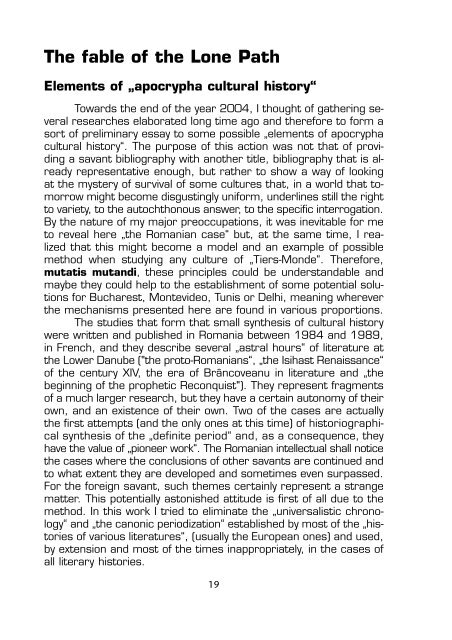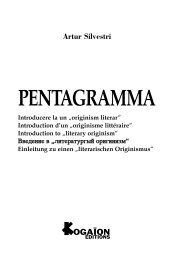genius loci pt. pdf.qxd - ROMANIAN LIBRARY
genius loci pt. pdf.qxd - ROMANIAN LIBRARY
genius loci pt. pdf.qxd - ROMANIAN LIBRARY
You also want an ePaper? Increase the reach of your titles
YUMPU automatically turns print PDFs into web optimized ePapers that Google loves.
The fable of the Lone Path<br />
Elements of „apocrypha cultural history“<br />
Towards the end of the year 2004, I thought of gathering several<br />
researches elaborated long time ago and therefore to form a<br />
sort of preliminary essay to some possible „elements of apocrypha<br />
cultural history“. The purpose of this action was not that of providing<br />
a savant bibliography with another title, bibliography that is already<br />
representative enough, but rather to show a way of looking<br />
at the mystery of survival of some cultures that, in a world that tomorrow<br />
might become disgustingly uniform, underlines still the right<br />
to variety, to the autochthonous answer, to the specific interrogation.<br />
By the nature of my major preoccupations, it was inevitable for me<br />
to reveal here „the Romanian case“ but, at the same time, I realized<br />
that this might become a model and an example of possible<br />
method when studying any culture of „Tiers-Monde“. Therefore,<br />
mutatis mutandi, these principles could be understandable and<br />
maybe they could help to the establishment of some potential solutions<br />
for Bucharest, Montevideo, Tunis or Delhi, meaning wherever<br />
the mechanisms presented here are found in various proportions.<br />
The studies that form that small synthesis of cultural history<br />
were written and published in Romania between 1984 and 1989,<br />
in French, and they describe several „astral hours“ of literature at<br />
the Lower Danube ("the proto-Romanians“, „the Isihast Renaissance“<br />
of the century XIV, the era of Brâncoveanu in literature and „the<br />
beginning of the prophetic Reconquist"). They represent fragments<br />
of a much larger research, but they have a certain autonomy of their<br />
own, and an existence of their own. Two of the cases are actually<br />
the first attem<strong>pt</strong>s (and the only ones at this time) of historiographical<br />
synthesis of the „definite period“ and, as a consequence, they<br />
have the value of „pioneer work“. The Romanian intellectual shall notice<br />
the cases where the conclusions of other savants are continued and<br />
to what extent they are developed and sometimes even surpassed.<br />
For the foreign savant, such themes certainly represent a strange<br />
matter. This potentially astonished attitude is first of all due to the<br />
method. In this work I tried to eliminate the „universalistic chronology“<br />
and „the canonic periodization“ established by most of the „histories<br />
of various literatures“, (usually the European ones) and used,<br />
by extension and most of the times inappropriately, in the cases of<br />
all literary histories.<br />
19



